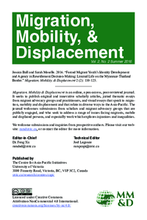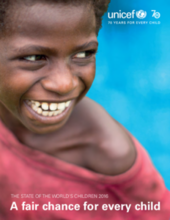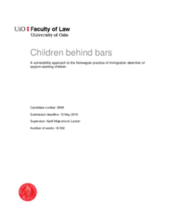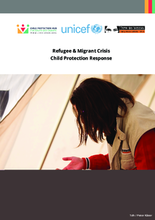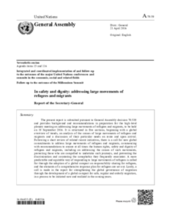Displaying 711 - 720 of 839
This document is an article focusing on the experiences of forced migrant youth aged 12 to 17 from Myanmar who have grown up as temporary residents along the northwest border of Thailand.
This report from UNICEF discusses the state of world’s children and points out that when it comes to the development and survival of children, odds are stacked against those from the poorest and most disadvantaged households.
This paper examines the immigration of children from Central America to the USA by setting the context of immigration across the USA–Mexico border, reviewing the extent and causes of the influx in immigration, and detailing the political, legal, and social work responses to the child migrants.
This is an update on the ISS-USA Regional Conference in Guatemala.
This paper discusses how Norway is in a position where it needs to balance its interests in immigration control with its obligations under international human rights law to protect the rights and liberties of asylum-seeking children. This document emphasizes the importance of protecting vulnerable children. In general this paper analyzes the ways that Norway acknowledges and protects the vulnerability of asylum seeking children. It also discusses the jurisprudence in place in relationship to vulnerable asylum-seeking children.
This capacity building package was developed to build the capacity of those responding to the refugee and migrant crisis to be able to address child protection concerns within the unique settings of the largely transit countries, in particular Croatia, Serbia and the former Yugoslavian Republic of Macedonia (tfYROM). The course book contains four core modules: Block A – Cultural Sensitivity; Block B – Impact of Being a Refugee/Migrant on Children; Block C – Working Together for the Benefit of Children; and Block D – Safeguarding. Each block takes about one and one-half hours.
This report by the UN Secretary General provides background and recommendations in preparation for the high -level plenary meeting on addressing large movements of refugees and migrants, to be held on 19 September 2016.
Children and young people, many from conflict-affected countries, who arrive in Australia on orphan relative visas are highly vulnerable. In this book by David Rose and Klaus Serr, professionals with experience of working in this field discuss their perceptions of the needs of these young people and their carers.
This is a longitudinal mixed-method study investigating the impact of parental migration on early childhood well-being and development in Thailand.
This is a longitudinal mixed-method study investigating the impact of parental migration on early childhood well-being and development in Thailand. This report presents the baseline results of quantitative and qualitative surveys.

